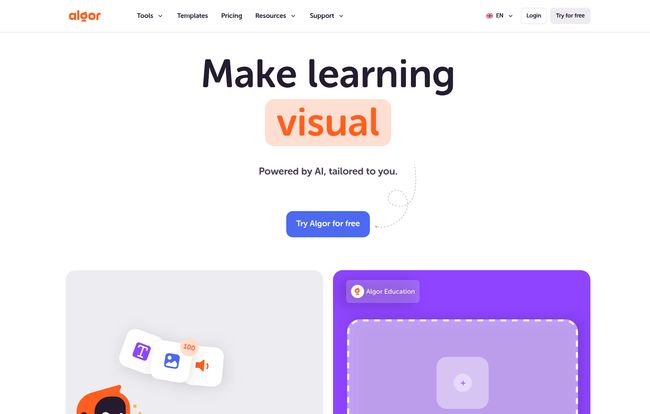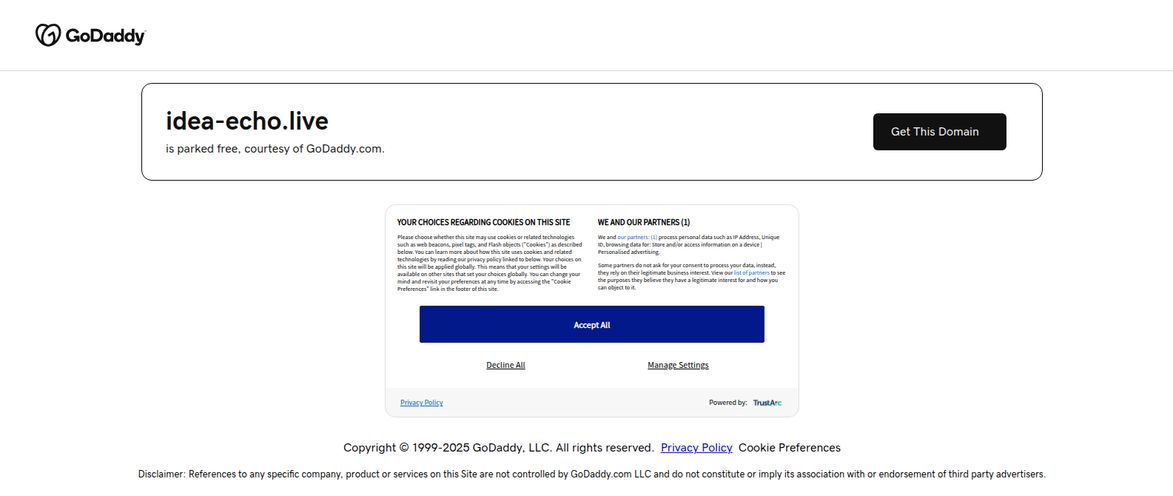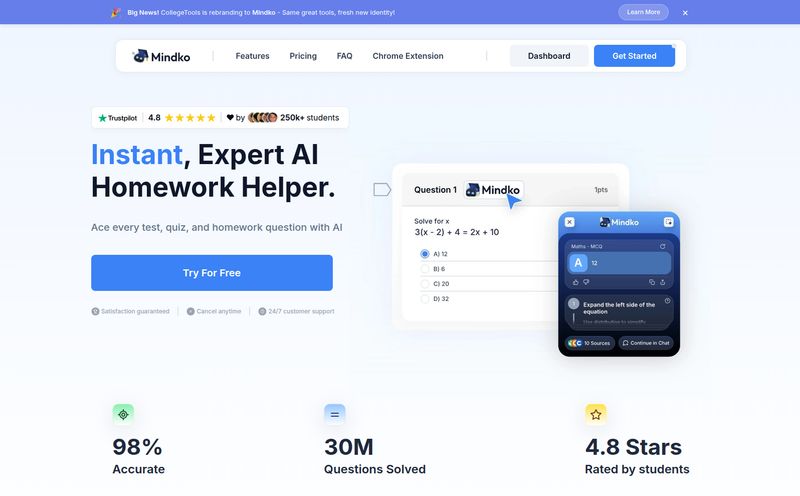I want you to picture my college dorm room. We're talking late 2000s. There are textbooks piled so high they look like structural supports, a rainbow of dried-out highlighters, and enough scribbled-on index cards to wallpaper the entire building. The air smells like lukewarm coffee and desperation. That was my 'study process.' It was a grind. A time-sucking, soul-crushing grind.
So when I first heard about tools like Algor Education, a part of me—the cynical SEO guy who has seen a million 'game-changing' platforms—rolled his eyes. Another AI gimmick? But another part of me—the guy who still has flashbacks to that dorm room—was genuinely intrigued. An AI that takes your messy notes, your dense textbook chapters, even a photo of a whiteboard, and turns it into clean, organized study materials? C'mon. That sounds too good to be true.
But I've spent years analyzing trends, and the AI boom in education isn't just a fad; it's a fundamental shift. So, I pushed my skepticism aside, grabbed a free account, and decided to see if Algor could have saved my younger self from all those caffeine-fueled all-nighters.

Visit Algor Education
So, What is Algor Education Anyway?
In a nutshell, Algor Education is an AI-powered platform designed to be a sort of sous-chef for your brain. You're the head chef, of course. You still have to do the actual learning. But Algor does all the tedious prep work. It takes your raw ingredients—a chunk of text, a blurry phone picture of your lecture notes, a web page, or even a video—and automatically chops, dices, and organizes it into something digestible. We're talking beautiful concept maps, clean summaries, flashcards, and even quizzes to test yourself.
The whole idea is to stop you from wasting time on the mechanics of studying and let you focus on, well, studying. It’s built for visual learning, transforming walls of text into structured, interconnected ideas. For someone like me who needs to see the connections to get it, that's a pretty big deal.
My First Run-Through: From Clutter to Clarity
I decided to test it with a dense article about Google's latest algorithm update. It was packed with jargon and complex ideas. Normally, I’d spend a good 30 minutes just pulling out the main points and trying to structure them in a Google Doc.
With Algor, I just pasted the text in. I clicked the 'Create from Text' button, selected 'Concept Map,' and held my breath. A few moments later, a map appeared. It wasn't just a random spray of bubbles; it had a clear hierarchy. The main topic was at the center, with primary sub-points branching off, and smaller details connected to those. It was about 85% of what I would have done manually, but it took about 30 seconds. That was my 'aha!' moment.
It's not about being lazy. It's about being efficient. Why spend an hour drawing boxes and lines when an algorithm can give you a rock-solid draft to work from? You can then edit, add nodes, change colors, and really make it your own. It’s a starting point, not a finished product, and that's its real power.
The AI-Powered Features I Actually Used
Algor isn't a one-trick pony. While the maps are the main attraction, the other tools work in concert to create a full study ecosystem.
The Star of the Show: AI Concept and Mind Maps
This is the headline feature. The ability to generate a visual map from text is incredible. It's perfect for understanding complex systems, historical timelines, or scientific processes. You can start from scratch and build your own map, but the AI generation is where the magic happens. It helps you quickly identify the core structure of any topic, which is often the hardest part.
Automatic Flashcards and Quizzes are a Lifesaver
Once you have your notes or map, Algor can automatically generate flashcards and quizzes based on that material. This is brilliant for active recall, which learning experts like Pooja K. Agarwal, Ph.D., have shown is far more effective than passively re-reading notes. Creating good flashcards is tedious work, so having a tool that does the heavy lifting is a massive time-saver. You can focus on answering, not just writing.
It Understands More Than Just Text
This was a pleasant surprise. You can snap a photo of a page in a book or your handwritten notes and Algor's OCR (Optical Character Recognition) will digitize it for you. This is huge. It means you're not locked into a purely digital workflow. That crumpled napkin with the brilliant idea you jotted down? Yeah, that can become a concept map now. It feels a little bit like living in the future, not gonna lie.
Who Is This Really For?
While the marketing clearly targets students, I see a broader audience.
- High School and College Students: This is the obvious one. Drowning in reading assignments? This is your lifeboat. It’s especially helpful for students with learning differences like dyslexia, as the visual and auditory (text-to-speech) features offer multiple ways to engage with material.
- Teachers and Educators: Instead of spending hours creating study guides, you can generate them in minutes. You can create a master map and share it directly with your students. It's a great tool for differentiating instruction.
- Lifelong Learners & Professionals: Studying for a professional certification like the PMP or a Google Ads exam? Algor can break down those dry technical manuals into something you can actually remember. I've used it for exactly this purpose.
The Price of Smarter Studying: A Look at Algor's Plans
Alright, let's talk turkey. Nothing in life is truly free, right? Algor operates on a freemium model with a credit system, which is pretty common for AI tools. Here’s a quick breakdown as of late 2023.
| Plan | Price (Yearly) | Price (Monthly) | Key Features |
|---|---|---|---|
| Free | $0 | $0 | 30 one-time credits, basic maps up to 15k characters, speech synthesis. |
| Basic | $5.99/mo | $7.49/mo | 150 credits/mo, premium export, up to 15k characters. |
| PRO | $8.99/mo | $10.99/mo | 1000 credits/mo (Yearly) or 700 (Monthly), up to 100k characters, advanced text-to-speech. |
Note: Prices are subject to change, so always check their official pricing page for the latest info.
My two cents? The Free plan is perfect for trying it out. 30 credits is enough to get a feel for the core features on a few documents. The Basic plan is likely the sweet spot for most students during a busy semester. The PRO plan is for the power users—the grad students, the teachers creating materials for multiple classes, or professionals with massive documents to dissect.
The Good, The Bad, and The Credit System
No tool is perfect. While I'm pretty upbeat about Algor, it's important to be balanced. The biggest pro is the sheer amount of time it saves. It streamlines the most boring parts of studying and lets you get to the good stuff faster. The customization and sharing options are also fantastic for collaborative work.
On the flip side, the main drawback is the credit system. Every time you use an AI feature, you spend credits. This can feel a bit restrictive, especially if you're on the free or basic plan and you're a bit click-happy. You have to be mindful of your usage. Also, be aware that subscriptions auto-renew, which is standard practice but something to keep an eye on if you only need it for a few months. But honestly, for teh value it provides, the paid plans feel pretty reasonable.
Conclusion: Is Algor Education Worth It?
After spending some quality time with the platform, I'm a convert. Algor Education isn't an AI that does the work for you. It's an AI that does the grunt work with you. It's a collaborator. It takes the mountain of information you need to learn and helps you build a trail map so you don't get lost.
It won't magically give you an 'A' on your next exam. You still need to put in the hours and engage your brain. But it can make those hours more productive, less stressful, and maybe even a little more enjoyable. It turns the passive act of reading into an active process of creation and connection.
And for that reason alone, my college-aged self would have paid for the PRO plan without a second thought. It's a genuinely useful tool in an age of information overload.
Frequently Asked Questions
1. How does Algor Education's AI work?
Algor uses advanced AI algorithms, likely based on natural language processing (NLP), to analyze the text or content you provide. It identifies key concepts, relationships, and hierarchies within the information to automatically structure it into concept maps, summaries, and other study aids.
2. Can I share the mind maps and notes I create?
Yes, absolutely. You can share your creations with friends, classmates, or students via a direct link. You can also export them in various formats like PDF or as an image, which is great for printing or embedding in other documents.
3. What are the AI credits used for in Algor?
AI credits are consumed whenever you use one of the platform's automatic, AI-powered features. This includes generating a concept map from text, creating automatic summaries, or generating quizzes and flashcards. Manual creation and editing of maps do not consume credits.
4. Is the free plan good enough to get started?
The free plan is an excellent starting point. It gives you 30 credits upon registration, which is enough to test the core functionality on several documents. It's a great way to see if Algor's style of visual learning works for you before committing to a paid plan.
5. What makes Algor different from other mind-mapping tools?
While many tools let you build mind maps manually, Algor's key differentiator is its powerful AI engine. The ability to automatically generate a structured, relevant map from a large block of text, an image, or a video is what sets it apart. It's less of a blank canvas and more of an intelligent assistant.
6. Do the paid subscriptions renew automatically?
Yes, according to their site, both monthly and annual subscriptions are set to renew automatically. You can, however, cancel the subscription at any time to prevent future charges.
Reference and Sources
- Algor Education Official Website
- Algor Education Pricing Page
- RetrievalPractice.org by Pooja K. Agarwal, Ph.D.



